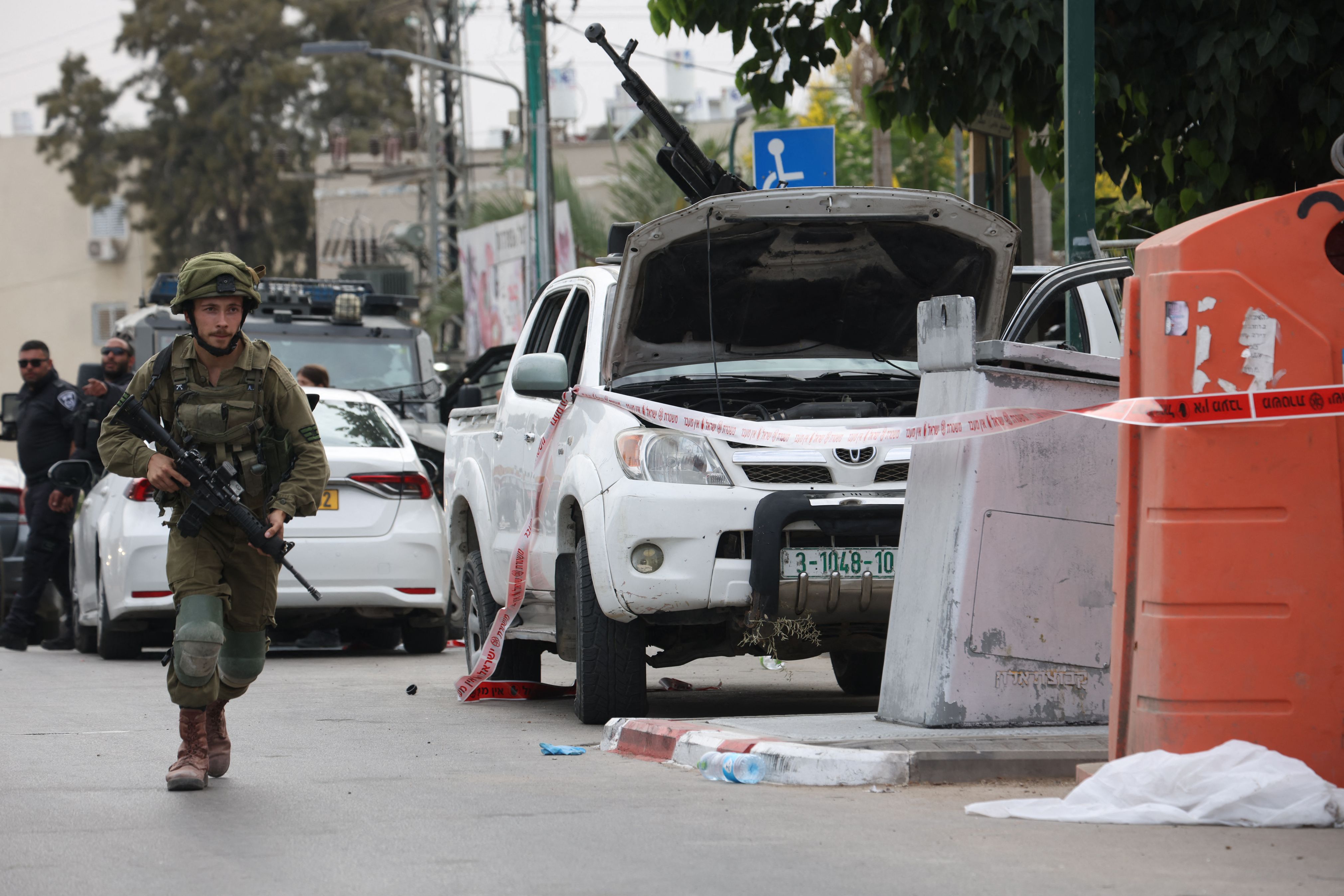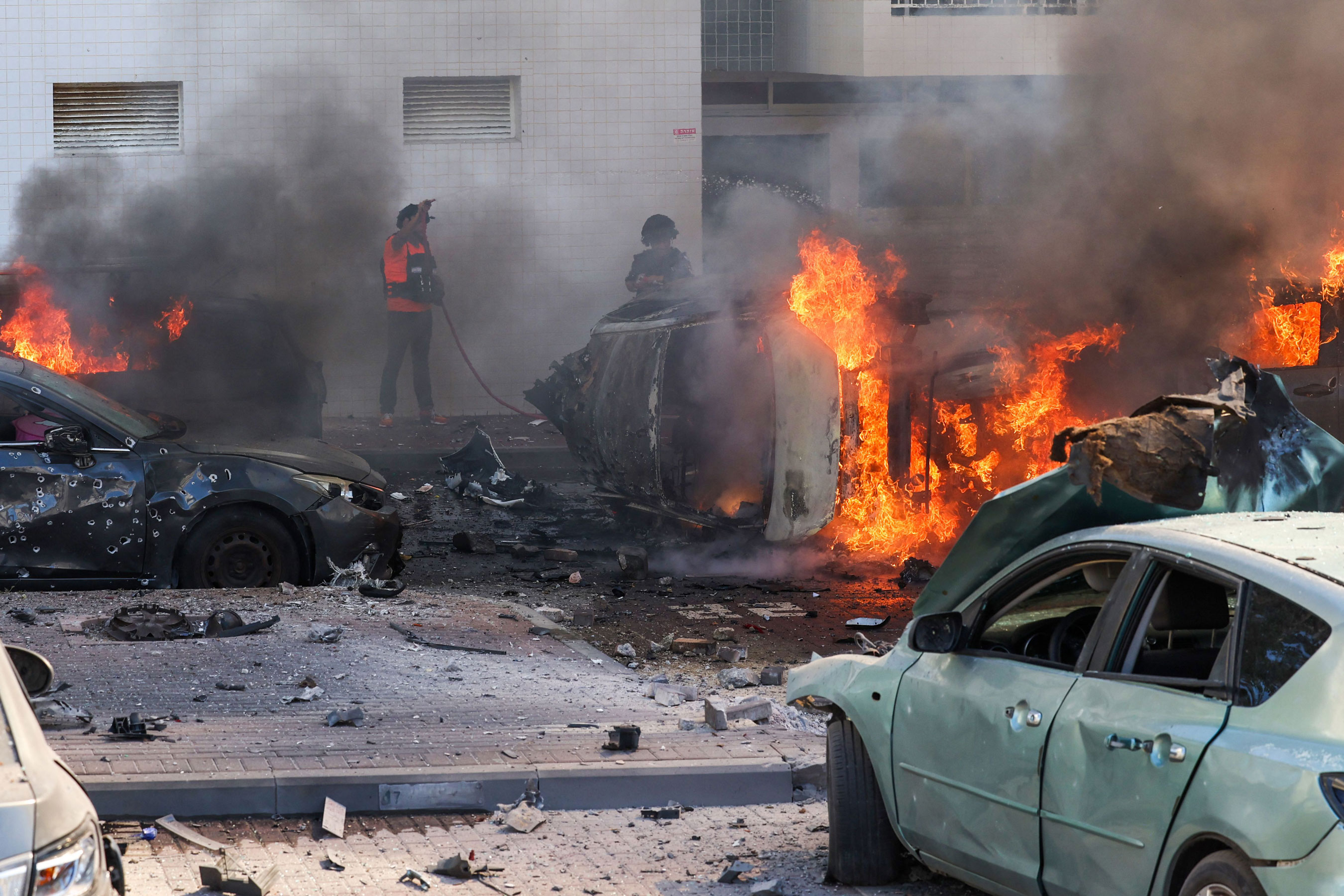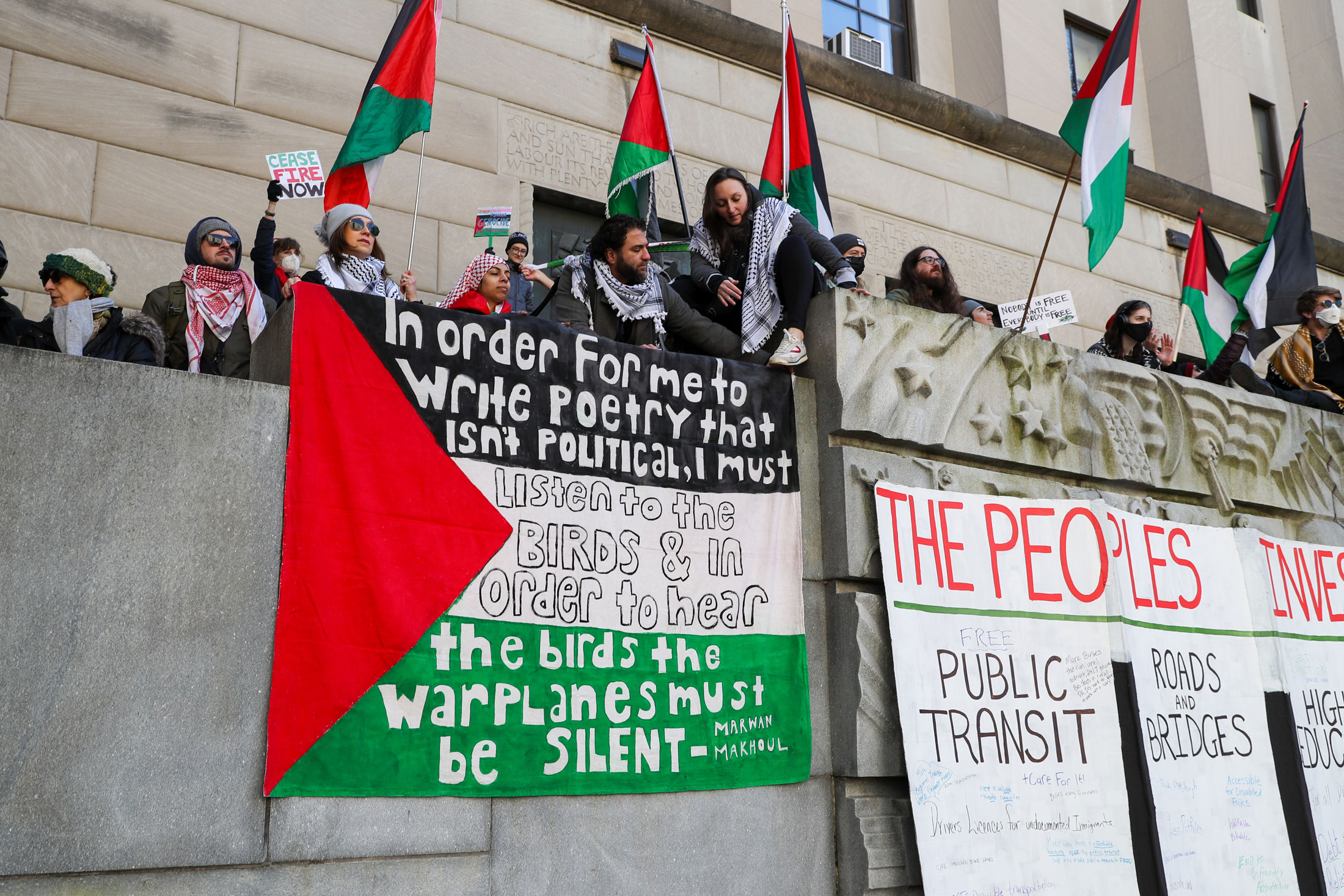Decision 2024
How the Israel-Hamas conflict is influencing politics in Pennsylvania
“Uncommitted” votes, a push to divest from Israel bonds and a fraught congressional primary are just some of the ways the war in Gaza has come home.

Protesters in Philadelphia temporarily blocked traffic on the Benjamin Franklin Bridge as part of a march calling for a ceasefire in Gaza. MATTHEW HATCHER/AFP VIA GETTY IMAGES
Israel’s ongoing war against Hamas continues to have ramifications across the country, the world – and the commonwealth.
Following the Oct. 7, 2023 attack against Israel that saw Hamas militants launch a cross-border attack on the country, killing more than 1,200 Israelis and taking more than 250 people hostage, Israel responded with a military siege that has, according to the Gaza Health Ministry, killed more than 30,000 Palestinians and prompted calls for a ceasefire from leaders around the globe. Now, the conflict seems poised to develop into a larger, regional conflagration following an Iranian attack against Israel involving drones and missiles.
The conflict has reverberated across the planet, including in Pennsylvania politics, where the war’s ramifications have injected even more uncertainty and tension into an already-fraught election cycle.
From a nationwide campaign to register protest votes in Democratic presidential primaries to a push to force the state treasury to divest from Israel, here’s how the Israel-Hamas war has become a political issue in the Keystone State.
The Uncommitted PA movement
Amid continuing protests of the war, organizers from different corners of the commonwealth are waging a campaign to secure at least 40,000 “uncommitted” write-in votes in Pennsylvania’s Democratic presidential primary to protest Israel’s military offensive in Gaza.
The Uncommitted PA campaign, organized by volunteers from a coalition of Palestinian American advocacy groups and several Pennsylvania-based chapters of the Democratic Socialists of America, is hoping to build on previous efforts in Michigan, Wisconsin and Connecticut – states where thousands of voters have already cast “uncommitted” or “uninstructed” votes to protest the war and pressure President Joe Biden over his handling of it.
Volunteers behind the Uncommitted PA push spoke with reporters ahead of the primary, stressing the need for a permanent ceasefire in Gaza and a halt of U.S. military aid to Israel. And with the Palestinian death toll surpassing 30,000 in late February – a figure that includes both military and civilian casualties, according to Gaza’s health ministry – many of those volunteers chose to describe the ongoing military offensive as “genocide.”
Hadeel Salameh, an advocate with the Harrisburg Palestine Coalition, said during the virtual press conference that she is concerned about U.S. tax dollars supporting Israel’s military siege. “As a Palestinian American, I have been deeply impacted by the ongoing genocide, especially because my taxes are being used to directly kill my own people,” Salameh said. “I am compelled to demand that the Biden administration calls for an immediate and permanent ceasefire.
“The primary on April 23 is really important because we are rejecting a presidential candidate who will not call for a permanent ceasefire,” Salameh added.

The Uncommitted PA campaign is backed by a range of organizations from across the state, including the Philadelphia, Pittsburgh and Erie chapters of the Democratic Socialists of America; Reclaim Philadelphia; the Harrisburg Palestine Coalition; the Philadelphia Palestine Coalition; and Pittsburgh Creatives Against Genocide, among others.
A note at the bottom of the campaign’s website states that the site is paid for by the Democratic Socialists of America.
The Pennsylvania-specific campaign comes on the heels of successful efforts in other states. In Wisconsin, more than 47,000 Democrats recently voted for an uninstructed option – more than double the organizers’ original goal of 20,000 uninstructed votes.
A protest push in Michigan gained significant traction as well, with 100,000 voters in the state choosing to register their vote as “Uncommitted” in the state’s Democratic presidential primary. That campaign – referred to as “Listen to Michigan” – then spread to other states.
Christopher Borick, a professor and director of Muhlenberg College’s Institute of Public Opinion, said that while protest votes have occurred in past presidential elections, they have usually focused on candidates rather than an issue-based campaign.

“There’s certainly a discontented group within the Democratic ranks that wanted to weigh in their displeasure – and this is an opportunity,” he said.
Sergio Cea, the political director for Reclaim Philadelphia, drew comparisons between Michigan and Uncommitted PA’s effort in the commonwealth in a statement he read during the press conference.
“‘Listen to Michigan’ was able to channel the anger of an ignored and important base of voters in a must-win battleground state similar to Pennsylvania. As a result, we’ve seen the Democratic Party move on this issue for the first time,” Cea said. “We do not take this recommendation lightly, but also know that in Pennsylvania, primaries are where we hold Democrats accountable. In 2020, Biden won Pennsylvania by 80,555 votes, and we know that every Philly vote will make a difference.”
Organizers have also made clear that this isn’t an effort designed to carry on into the general election. “There’s still time for Biden to drastically change his administration’s course of action in Gaza,” Cea continued. “This is a warning to Joe Biden. We are committed to defeating Trump in the general election. We can’t do it alone. It’s up to him to win back voters’ trust by standing with the majority of American voters and the entire international community to use his power and influence to stop this genocide.”

While organizers found success in states like Michigan, Wisconsin and New York, it may prove difficult to measure the success of the Pennsylvania campaign, as write-in “uncommitted” votes will be lumped in with other write-in votes in the state.
The Biden administration has pushed back on the claims that Israel is committing genocide in Gaza, with Defense Secretary Lloyd Austin telling the Senate Armed Services Committee: “We don’t have any evidence of genocide being (committed),” according to Politico. In a recent call with Benjamin Netanyahu, the prime minister of Israel, Biden pressed for an immediate ceasefire and said recent Israeli strikes on humanitarian workers are “unacceptable.”
Several high-profile Pennsylvanians have also come to Biden’s defense.
“As a Muslim American, I know that President Biden has my back and will fight for our community,” state Sen. Sharif Street, who serves as chair of the Pennsylvania Democratic Party, said in a statement. “While Donald Trump and MAGA Republicans threaten our way of life, President Biden has stood up to protect our reproductive rights, economic opportunity, and democracy.”
“This is the choice we face at the ballot box this November,” Street added. “With the stakes this high, I am proud to be supporting President Biden.”

Vandalism and threats
As the conflict continues in Gaza, Pennsylvania has experienced a growing number of threats and vandalism targeting Jewish and Muslim communities.
In the weeks following Oct. 7, separate incidents at the University of Pennsylvania and Lafayette College prompted the U.S. Department of Education to investigate the institutions over “alleged shared ancestry violations of Title VI of the Civil Rights Act of 1964.”
In recent weeks, several synagogues and Jewish organizations across the state have faced bomb threats, as well as instances of vandalism. Temple Beth Hillel-Beth El, located in the Philadelphia suburb of Wynnewood, was vandalized two separate times in late March, according to CBS News, with a swastika spray-painted on a sign outside of the synagogue during the second act of vandalism.
The incident drew a response from the Pennsylvania Human Relations Commission, with PHRC Chair Joel Bolstein stating that the commission “will remain vigilant in our efforts to combat discrimination and hate in all of its forms.
“The swastika is a universally recognized symbol of hatred not just against Jews but against all Americans,” Bolstein continued. “As Rabbi Abraham Cooper from the Simon Wiesenthal Center said: ‘The swastika is shorthand for every racist and bigot on the planet.’ Whoever committed this act of vandalism needs to be reminded that hate has no place in Pennsylvania.”
The Muslim community has been on alert, as well. In April, three people were shot after gunfire was exhanged at a Philadelphia park where an Eid al-Fitr celebration was taking place.

In a separate incident, the Jewish Federation of the Lehigh Valley received an email in mid-April threatening to blow up its facilities and synagogues, according to WFMZ. U.S. Rep. Susan Wild, who represents the 7th Congressional District and is Jewish, condemned the threat in a statement. The threat was later determined not to be credible.
“I was heartbroken to hear of the threats made against our community’s Jewish organizations today, and am thankful that above all, everyone is safe,” Wild said. “Credible or not, this threat is not an isolated incident. There is a dangerous pattern of antisemitism that continues to run rampant across our district, state and country. It is unacceptable, and we cannot simply condemn it when it happens – we must take concrete steps to prevent these potential acts of violence.”
AIPAC’s exit from PA-12
The “Uncommitted” movement has become a factor in downballot races as well.
In Pennsylvania’s 12th Congressional District, the movement has become an issue in the Democratic primary race between incumbent U.S. Rep. Summer Lee and primary challenger Bhavini Patel, who recently called on Lee to denounce the write-in campaign in their debate.
Lee is no stranger to primary challenges. In 2022, several pro-Israel groups spent millions in an effort to defeat Lee in the primary, as well as the general election. During that cycle, the American Israel Public Affairs Committee, a pro-Israel lobbying group in the U.S., spent millions across the country to try and give its preferred candidates a boost.
According to OpenSecrets, a research group that tracks money in U.S. politics, AIPAC gave the super PAC United Democracy Project approximately $8.5 million in the 2022 election cycle. In total, United Democracy Project raised $31 million in the cycle, spending $26 million on races across the nation.
Per OpenSecrets, most of the United Democracy Project-backed candidates were successful in 2022, with two notable exceptions: Despite heavy spending from the United Democracy Project against them, U.S. Rep. Shri Thanedar of Michigan and Lee both won their races.
In Lee’s case, the super PAC spent $2.2 million in opposition to her in the 2022 primary, and an additional $1.2 million against her in the general election. During that cycle, a United Democracy Project spokesperson characterized Lee as an “anti-Israel” candidate and cited her relationships with Congress’ progressive “Squad” as one of the reasons for the group’s opposition to her.
In the wake of the Israel-Hamas war, Lee has been a staunch supporter of a ceasefire, calling for one within a month of Hamas’ Oct. 7 attack on Israel. Now, two years after her bruising debut victory, this election cycle is shaping up differently.
According to reporting from Semafor, AIPAC has refrained from spending big in this year’s 12th Congressional District primary.
AIPAC spokesperson Marshall Wittmann told Jewish Insider this month that AIPAC “will be engaged in races where our involvement can have the greatest impact,” but did not say if the organization would be supporting Patel’s primary bid.
At press time, neither AIPAC nor the Democratic Majority For Israel, another pro-Israel advocacy group, have made expenditures in the PA-12 Democratic primary. AIPAC’s political action committee, however, has contributed money to other candidates.
In 2024 thus far, the PAC has given $5,000 each to U.S. Reps. Scott Perry, Mike Kelly, Glenn “GT” Thompson, Susan Wild, and U.S. Sen. Bob Casey, and sent a $4,000 contribution to Democratic U.S. Rep. Chris Deluzio, according to Federal Election Commission records.
Frustration over Israel bonds
The Israel-Hamas war continues to influence politics at the state level.
In October, Pennsylvania Treasurer Stacy Garrity announced that the Treasury Department was investing $20 million in Israel bonds, bringing the state’s total investment in Israel bonds to $56 million.

On Oct. 12, Garrity called the bonds a “smart, dependable investment” for the commonwealth. “Israel is our greatest ally in the Middle East, and I will always stand with them,” Garrity said in a statement after announcing the state’s investment. “Israel bonds are a smart, dependable investment with a proven track record – and it’s especially important to show our support at a time when the people of Israel are facing horrific terrorism.”
The bonds are debt securities issued by the state of Israel. Such investments in Israel Bonds provide Israel with a loan, which is eventually paid back in full and with interest, according to the Development Corporation for Israel, the organization that sells the bonds in the U.S.
In the aftermath of the Oct. 7 attack, many state and local governments rushed to buy Israel bonds. Florida, New York, Ohio, Texas, Nevada, Louisiana and Indiana are just a few of the states that bought them in the weeks following the Hamas attack, according to CNBC. Some local governments – like Broward and Palm Beach counties in Florida, as well as Franklin County, Ohio – have also invested in the bonds.
In the four weeks following the cross-border attack, the Development Corporation for Israel raised more than $1 billion in bond sales, which ultimately helped the corporation have a record year, per CNBC.
In February, pro-Palestinian protesters gathered in Harrisburg to protest the state’s investments in Israel bonds. According to a report from Spotlight PA, dozens of protesters at the Pennsylvania Capitol complex were arrested in February and cited with trespassing after organizing a public protest calling for the state to divest from Israel.
The topic of Israel bonds has also emerged in the state’s Democratic primary for treasurer. The two Democratic candidates have differing stances on the bonds, with Erin McClelland opposing further investments in Israel bonds, while state Rep. Ryan Bizzarro has continued to express support for state investment in the bonds.
The bonds have also become a focus of the Uncommitted PA movement, which, in addition to a permanent ceasefire in Gaza, has called for the reinstatement of humanitarian aid in Gaza and has pushed Garrity to divest Pennsylvania from its $56 million in Israel bonds.
According to Garrity’s office, the state has been investing in Israel bonds for decades. Treasury spokesperson Samantha Heckel said that there are no plans at this time to buy more Israel bonds.
In a statement to City & State, Garrity defended her office’s decision to invest in Israel bonds, and said she was proud to stand with a U.S. ally like Israel.
“For more than three decades, State Treasurers from both political parties have invested in Israel Bonds because they provide a strong return for taxpayers and because Israel is America’s greatest ally in the Middle East,” Garrity said. “I’m proud to continue that long-standing tradition, and I’m proud to stand with our ally.
“If Hamas stopped fighting, there would be no more war,” she added. “If Israel stopped fighting, there would be no more Israel.”
